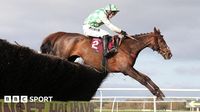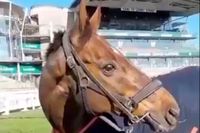In a tragic turn of events, Celebre d'Allen, a 13-year-old racehorse that competed in the Grand National at Aintree, has died following a collapse during the race on Saturday, April 5, 2025. The horse, trained by Philip Hobbs and Johnson White, was a 125/1 outsider and was pulled up after the final fence, collapsing shortly thereafter on the track.
After receiving immediate veterinary attention, Celebre d'Allen was able to walk into a horse ambulance and was transported to the racehorse stables for further assessment. Initially, his trainers reported signs of recovery, stating, "We’re heartbroken to share that Celebre d’Allen has passed away. He received the very best treatment by the veterinary teams and was improving. However, he deteriorated significantly last night and could not be saved. He was a wonderful horse and we will all miss him greatly," according to a statement released on Tuesday, April 8, 2025.
However, the horse's condition took a turn for the worse, leading to his death on Monday night, April 7, 2025. The British Horseracing Authority (BHA) confirmed that Celebre d'Allen had suffered from heatstroke, which was reported by ITV's Matt Chapman shortly after the race. On Sunday, co-trainer Johnson White shared a video of Celebre d'Allen looking "much brighter" and indicated that he would be moved to a nearby livery yard for continued recovery, which added to the hope surrounding the horse's condition.
Jockey Micheal Nolan faced scrutiny for his ride, as he continued to race Celebre d'Allen even when it was clear the horse was struggling. The BHA conducted an inquiry and subsequently handed Nolan a 10-day suspension for breaching riding rules by continuing to ride when Celebre d'Allen appeared to have "no more to give" after the penultimate fence. Nolan's actions have sparked significant backlash, culminating in a torrent of abuse directed at him online, leading him to delete his social media profiles.
Animal rights groups have condemned the circumstances surrounding Celebre d'Allen's death. Ben Newman, a spokesperson for Animal Rising, stated, "The blame for his death lies not with any individual, but with the 'sport' of horse racing itself. Again and again, we see horses pushed far beyond their limits, to the point of injury, collapse, and death." Similarly, Nina Copleston-Hawkens of Animal Aid described the situation as "absolutely abhorrent" and labeled it "criminal" to allow a horse of this age to compete in such a grueling race.
World Horse Welfare's chief executive, Roly Owers, expressed sadness over the incident and emphasized the need for lessons to be learned from this tragedy. He stated, "We are deeply saddened to hear about the death of Celebre d'Allen after last Saturday's Grand National and our heart goes out to all those who cared for him. Every effort must be made to learn lessons from this very sad outcome." The BHA has committed to analyzing the race and the incident in detail, including conducting a post-mortem examination of Celebre d'Allen.
This year's Grand National was particularly challenging, with 18 of the 34 horses either pulling up, falling, or unseating their riders, leaving only 16 to finish the race. Another horse, Broadway Boy, also suffered a serious fall during the event. Tom Bellamy, the jockey for Broadway Boy, was unseated and later taken to the hospital, raising concerns among fans about the safety of both horses and riders.
In the wake of this incident, Aintree Racecourse issued a statement expressing their condolences and highlighting the unique bond that those who care for racehorses share with the animals. They stated, "Celebre d'Allen was a much-loved member of Philip and Johnson's team and all of us at Aintree are deeply saddened by today's news. Those who look after British racing's equine athletes every day have a unique bond with their horses and provide the very best care imaginable. Our thoughts are with everyone connected with Celebre d'Allen."
As the racing community mourns the loss of Celebre d'Allen, discussions surrounding the safety and welfare of racehorses are likely to intensify. The BHA has previously made changes to the Grand National in 2024 to improve safety, including reducing the number of runners. However, the death of Celebre d'Allen has reignited calls for further reforms to ensure the safety of these athletes.
In conclusion, the passing of Celebre d'Allen serves as a stark reminder of the risks involved in horse racing and has prompted a renewed focus on the treatment and care of racehorses. As this story develops, it is clear that the conversations around the ethics of horse racing will continue to grow, fueled by the heart-wrenching loss of this beloved horse.








